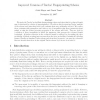Free Online Productivity Tools
i2Speak
i2Symbol
i2OCR
iTex2Img
iWeb2Print
iWeb2Shot
i2Type
iPdf2Split
iPdf2Merge
i2Bopomofo
i2Arabic
i2Style
i2Image
i2PDF
iLatex2Rtf
Sci2ools
120
click to vote
DCC
2008
IEEE
2008
IEEE
Improved versions of Tardos' fingerprinting scheme
We study the Tardos' probabilistic fingerprinting scheme and show that its codeword length may be shortened by a factor of approximately 4. We achieve this by retracing Tardos' analysis of the scheme and extracting from it all constants that were arbitrarily selected. We replace those constants with parameters and derive a set of inequalities that those parameters must satisfy so that the desired security properties of the scheme still hold. Then we look for a solution of those inequalities in which the parameter that governs the codeword length is minimal. A further reduction in the codeword length is achieved by decoupling the error probability of falsely accusing innocent users from the error probability of missing all colluding pirates. Finally, we simulate Tardos scheme and show that, in practice, one may use codewords that are shorter than those in the original Tardos scheme by a factor of at least 16.
Codeword Length | Computer Graphics | DCC 2008 | Original Tardos Scheme | Probabilistic Fingerprinting Scheme |
| Added | 25 Dec 2009 |
| Updated | 25 Dec 2009 |
| Type | Conference |
| Year | 2008 |
| Where | DCC |
| Authors | Oded Blayer, Tamir Tassa |
Comments (0)

